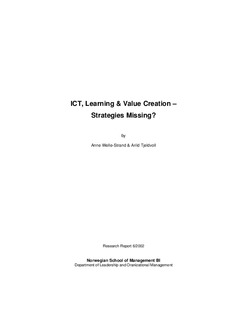ICT, learning & value creation: strategies missing?
Research report
Permanent lenke
http://hdl.handle.net/11250/94149Utgivelsesdato
2002Metadata
Vis full innførselSamlinger
- Research Reports [140]
Sammendrag
What are effects of the ICT-revolution on the organising of learning within universities and corporations and on the “learning relations” between corporations and universities? The pilot study has responded to this question by reviewing a sample of existing relevant literature and by conducting policy analysis and interviews with key persons of two Norwegian organisations, The Norwegian School of Management (BI) and Telenor. The research question was specified into three sub questions:
How does universities and corporations e-react as organisations to the current context of a global informational society and a global conomy?
How well are educational rationales understood and implemented by universities’ and corporations’ management and staff?
To which extent has a functional e-Learning Meeting Place for learning partnerships between university and corporation been established?
The literature review and the empirical pilot have confirmed that the ICT-revolution has had a dramatic effect on universities’ and corporations’ policies and implementation of ICT expected to facilitate learning, and to make it more efficient. However, it was not found convincingly empirically underpinned that all ICT investments for learning purposes are goal- and cost-effective. There is a lack of overall strategies for the use of ICT based learning. And, an organisational schizophrenia has been found between policy writers and staff in terms of the need for pedagogical understanding. Such understanding is absent in the policy documents, while strongly expected by staff. The top management does not show sufficient concern for a pedagogically rational use of ICT based learning. A pedagogically sound solution needs to focus on how people actually learn and how to best facilitate for different modes of learning. This also touches on the need to balance individual and corporate needs and goals. Such considerations ought to be reflected in an articulated corporate learning strategy endorsed by the top management and implemented in such a manner that both time and space are created to facilitate for learning. E-learning meeting places between universities and corporations have not yet been developed.
The findings of and conclusions have given direction, motivation and new ideas for a follow-up comprehensive research project, including several universities and corporations in three countries.
Serie
Research Report06/2002
